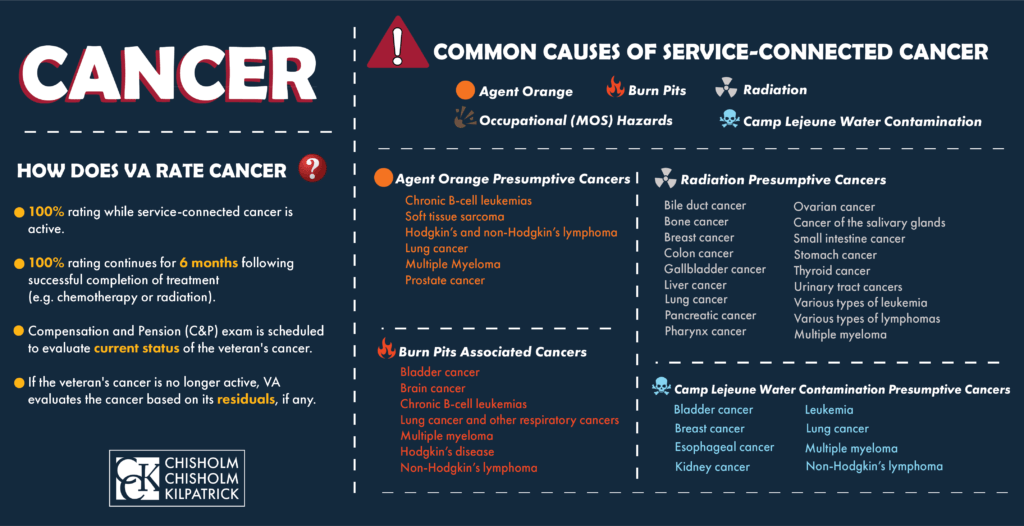VA Disability for Gastrointestinal Cancers

CCK Law: Our Vital Role in Veterans Law
On August 10, 2022, the Honoring Our Promise to Address Comprehensive Toxics (PACT) Act of 2021 added 23 conditions to the Department of Veterans Affairs’ presumptive list for military toxic exposure. Among these conditions are gastrointestinal cancers of any type.
What Are Gastrointestinal Cancers?
Gastrointestinal (GI) cancers are cancers that develop along the GI tract, also known as the digestive tract. The GI tract begins at the esophagus (the tube connecting the mouth to the stomach) and ends at the anus (where waste leaves the body).

Types of Gastrointestinal Cancers
Common types of gastrointestinal cancers include (but are not limited to):
- Colon cancer: Also known as colorectal cancer, signs of colon cancer include a change in bowel habits that lasts for multiple days (e.g., constipation, diarrhea, harrowing of the stool); rectal bleeding with bright red blood; dark brown or black blood in the stool; cramping and stomach pain; weakness and fatigue; and sudden weight loss.
- Esophageal cancer: Most esophageal cancers do not cause symptoms until an advanced stage, which, unfortunately, makes it more difficult to treat. The most common symptoms include trouble swallowing, weight loss, chest pain, hoarseness, chronic cough, vomiting, bone pain, and bleeding into the esophagus.
- Liver cancer: Symptoms associated with liver cancer include weight loss, feeling full after very small meals, loss of appetite, nausea, vomiting, an enlarged liver or spleen, stomach pain or pain near the right shoulder blade, swelling in the abdomen, itching, and jaundice (i.e., yellowing of the skin and eyes).
- Pancreatic cancer: Pancreatic cancers usually only cause symptoms when they have already grown large or spread outside of the pancreas. Symptoms include jaundice, stomach or back pain, weight loss and loss of appetite, nausea, vomiting, enlargement of the gallbladder or liver, blood clots, and diabetes.
- Stomach (gastric) cancer: As with other cancers mentioned above, stomach cancer also typically does not show symptoms until the cancer has advanced. Common signs and symptoms of stomach cancer include poor appetite, unintentional weight loss, abdominal pain, feeling full after very small meals, heartburn, nausea, vomiting with or without blood, abdominal swelling or fluid build-up, blood in the stool, tiredness or weakness, and jaundice.
Other less common types of GI cancers include neuroendocrine tumors, gastrointestinal stromal tumors, small intestine cancers, gallbladder cancer, and anal cancer.
Gastrointestinal Cancers Treatments
Treatments for gastrointestinal cancer may include radiation therapy, chemotherapy, targeted therapy, immunotherapy, surgery (i.e., complete removal of the tumor), or a combination of these treatments. A patient’s treatment depends on the location and stage of the cancer, as well as their age and general health. Treatments are more effective when the cancer is detected at an early stage; however, this can be difficult.
Presumptive Service Connection for Gastrointestinal Cancers
What Is Presumptive Service Connection?
VA presumes service connection for certain conditions based on the time and location of the veteran’s service. The intention is to make it easier for veterans to secure disability compensation.
Presumptions eliminate the need for veterans to provide a nexus opinion. They simply need to show they were at a certain place at a certain time and have a specific condition, and the link between the two is presumed.

PACT Act and Military Toxic Exposure
As mentioned above, the PACT Act added 23 conditions to VA’s presumptive list for military toxic exposure, including gastrointestinal cancers of any type. Essentially, veterans who are considered “covered veterans” can qualify for presumptive service connection for gastrointestinal cancer. The bill defines covered veterans as the following:
- A veteran who, on or after August 2, 1990, performed active military, naval, air, or space service while assigned to a duty station in, including air space above:
- Bahrain
- Iraq
- Kuwait
- Oman
- Qatar
- Saudi Arabia
- Somalia
- United Arab Emirates
- A veteran who, on or after September 11, 2001, performed active military, naval, air, or space service, while assigned to a duty station, including the airspace above:
- Afghanistan
- Djibouti
- Egypt
- Jordan
- Lebanon
- Syria
To be eligible for this presumption, veterans simply must have evidence that they served in one of the qualifying locations during the qualifying periods and have a diagnosis of a gastrointestinal cancer. This presumption also applies to surviving spouses of veterans seeking retroactive Dependency and Indemnity Compensation (DIC) benefits.
When President Biden officially signed the PACT Act into law, he and VA Secretary McDonough announced that the rollout period for certain presumptive conditions for covered veterans would be waived. Initially, these presumptions were effective upon the date of enactment of the PACT Act only for certain conditions, while presumptions for other conditions would become effective on a rolling basis over the next few years. Now, with this new rollout plan, the presumption for all conditions are effective from the date the PACT Act was signed (August 10, 2022) and VA will begin adjudicating these claims as soon as January 2023. Veterans should know, however, that newly eligibly claimants will not get retroactive benefits back to the date of their original claim unless they are filing a claim for DIC benefits.
View the full list of PACT Act presumptive conditions here.
Direct Service Connection for Gastrointestinal Cancers
Veterans who do not meet the requirements for presumptive service connection can also file a VA claim for direct service connection. VA requires evidence of the following three things to grant service connection on a direct basis.
- An in-service event, injury, or illness;
- A current diagnosis by a medical professional;
- A medical nexus, or link, between the in-service event and current diagnosis.
It important to demonstrate a connection between your military service and gastrointestinal cancer. You can show evidence of this connection by securing a private nexus opinion from a medical professional and/or by submitting lay evidence. Lay evidence, or lay statements, can be written by you or anyone who knows you and can speak to your condition.
VA may also schedule you for a Compensation and Pension (C&P) exam to determine if a connection exists.
Agent Orange Exposure and Gastrointestinal Cancers
While VA does not presume gastrointestinal cancers as connected to Agent Orange exposure, veterans can still prove their claim with supporting medical evidence and lay testimony. VA does, however, include certain cancers on its presumptive Agent Orange list, such as bladder cancer, chronic B-cell leukemias, multiple myeloma, prostate cancer, respiratory cancer, and soft tissue sarcomas.
The PACT Act also expanded its presumptions related to Agent Orange exposure to include veterans with service in Thailand, Laos, Cambodia, Guam, American Samoa, and Johnston Atoll.
Veterans can read more about the effects of Agent Orange and establishing service connection for herbicide exposure.
VA Disability Ratings for Gastrointestinal Cancers
VA automatically assigns a 100 percent disability rating to veterans with a service-connected active cancer, including gastrointestinal cancers. This rating continues for as long as the cancer is active, and then for another six months following the successful completion of a treatment program, such as chemotherapy, radiation, or surgery.
VA will then schedule a C&P examination to reevaluate the status of the cancer. If the examination shows that the veteran’s cancer is no longer active and is in remission, VA will assign a disability rating based on the severity of its residuals.

Was Your VA Claim for Gastrointestinal Cancer Denied?
If VA denied you disability benefits for your service-related gastrointestinal cancer, Chisholm Chisholm & Kilpatrick LTD may be able to help. The accredited attorneys and claims agents at CCK have decades of experience assisting veterans acquire their rightfully earned benefits. Call CCK today at 800-544-9144 to schedule a free consultation with a member of our team.
About the Author
Share this Post
